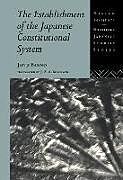The Establishment of the Japanese Constitutional System
Einband:
Fester Einband
EAN:
9780415004978
Untertitel:
Englisch
Genre:
Internationales Recht
Autor:
Junji Banno
Herausgeber:
Taylor & Francis Ltd (Sales)
Anzahl Seiten:
266
Erscheinungsdatum:
30.04.1992
ISBN:
978-0-415-00497-8
Zusatztext `This is an important work of scholarship translated into English with great skill... can be read with profit by all political historians interested in the creation of constitutional systems.' - Ian Neary! Asian Affairs`Banno is fortunate in having a translator who is a specialist in Japanese politics! J.A.A. Stockwin! who writes as clearly in English as Banno does in Japanese. Their approach in this translation - working closely together over many months - guaranteed accuracy to the original and smoothness in rendition... Banno's contribution will long remain the standard work in English on the subject.' - George Akita! Monumenta Nipponica Informationen zum Autor Junji Banno is Director of the Institute of Social Science at the University of Tokyo. J.A.A. Stockwin is Nissan Professor of Modern Japanese Studies at the University of Oxford and Director of the Nissan Institute of Japanese Studies. Klappentext Following the Meiji Restoration of 1868, Japan adopted many Western practices and institutions, including a constitution in 1889."The Establishment of the Japanese Constitutional System" discusses how the Constitution actually worked during its first decade. After the Diet--or parliament--was established, the oligarchs who had framed the Constitution found that the Diet intervened more than they had intended. In an equally surprising turn, the popular political parties who had initially opposed the expensive nationalist and industrial expansionist plans of the government eventually became supporters. The reasons for this drastic change in basic attitudes present a fascinating series of questions which Junji Banno addresses in this book. To answer these questions, the author analyzes the constitutional framework and the economic interests of the key supporters of the popular parties--the agricultural landowners. The changing interests of this group in the mid 1890s forced the popular party leaders to modify their demand for "cheap government." Variations in the prices of agricultural products greatly influenced the attitudes of landowners towards government financial policies, shifting their focus away from tax reduction and towards industrialization as an attractive policy. Zusammenfassung The 1889 Meiji constitution: how it actually worked, the establishment of the Diet and the shifting roles and interests of the parties. A Japanese classic translated by one our leading authorities. Inhaltsverzeichnis Introduction: Issues and methods Part I The political situation before the Sino-Japanese War 1 Some problems of transcendentalism 2 'Enrich the Nation and Strengthen the Armed Forces' and 'Lighten the People's Burdens' as issues in the early Diet sessions Part II Political conflict after the Sino-Japanese War 3 Post-war reconstruction and the reactions of various political forces 4 The formation of the Yamagata faction 5 The question of increasing the land tax 6 The collapse of the party Cabinet 7 Concluding the land tax increase bill...
Autorentext
Junji Banno is Director of the Institute of Social Science at the University of Tokyo. J.A.A. Stockwin is Nissan Professor of Modern Japanese Studies at the University of Oxford and Director of the Nissan Institute of Japanese Studies.
Klappentext
Following the Meiji Restoration of 1868, Japan adopted many Western practices and institutions, including a constitution in 1889."The Establishment of the Japanese Constitutional System" discusses how the Constitution actually worked during its first decade.
After the Diet--or parliament--was established, the oligarchs who had framed the Constitution found that the Diet intervened more than they had intended. In an equally surprising turn, the popular political parties who had initially opposed the expensive nationalist and industrial expansionist plans of the government eventually became supporters. The reasons for this drastic change in basic attitudes present a fascinating series of questions which Junji Banno addresses in this book.
To answer these questions, the author analyzes the constitutional framework and the economic interests of the key supporters of the popular parties--the agricultural landowners. The changing interests of this group in the mid 1890s forced the popular party leaders to modify their demand for "cheap government." Variations in the prices of agricultural products greatly influenced the attitudes of landowners towards government financial policies, shifting their focus away from tax reduction and towards industrialization as an attractive policy.
Zusammenfassung
The 1889 Meiji constitution: how it actually worked, the establishment of the Diet and the shifting roles and interests of the parties. A Japanese classic translated by one our leading authorities.
Inhalt
Introduction: Issues and methods Part I The political situation before the Sino-Japanese War 1 Some problems of transcendentalism 2 'Enrich the Nation and Strengthen the Armed Forces' and 'Lighten the People's Burdens' as issues in the early Diet sessions Part II Political conflict after the Sino-Japanese War 3 Post-war reconstruction and the reactions of various political forces 4 The formation of the Yamagata faction 5 The question of increasing the land tax 6 The collapse of the party Cabinet 7 Concluding the land tax increase bill

Leider konnten wir für diesen Artikel keine Preise ermitteln ...
billigbuch.ch sucht jetzt für Sie die besten Angebote ...
Die aktuellen Verkaufspreise von 6 Onlineshops werden in Realtime abgefragt.
Sie können das gewünschte Produkt anschliessend direkt beim Anbieter Ihrer Wahl bestellen.
Loading...
Die aktuellen Verkaufspreise von 6 Onlineshops werden in Realtime abgefragt.
Sie können das gewünschte Produkt anschliessend direkt beim Anbieter Ihrer Wahl bestellen.
| # | Onlineshop | Preis CHF | Versand CHF | Total CHF | ||
|---|---|---|---|---|---|---|
| 1 | Seller | 0.00 | 0.00 | 0.00 |
